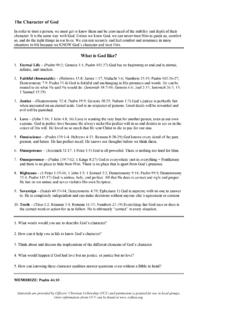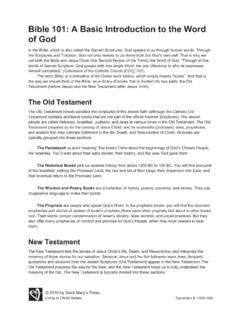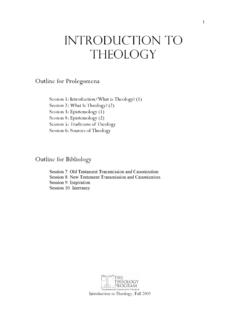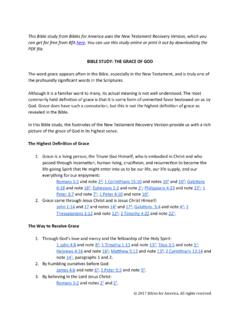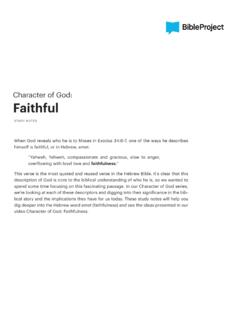Transcription of ESTHER: A STORY OF THE PROVIDENCE OF GOD IN A PAGAN …
1 EESSTTHHEERR:: AA SSTTOORRYY OOFF TTHHEE PPRROOVVIIDDEENNCCEE OOFF GGOODD IINN AA PPAAGGAANN LLAANNDD AAnn OOrrpphhaann GGiirrll iiss EEnnttrruusstteedd wwiitthh IIssrraaeell ss FFuuttuurree ~ Peggi Klubnik TABLE OF CONTENTS HISTORICAL BACKGROUND ..3 INTRODUCTION TO THE BOOK ..4 CHAPTER ONE: BEAUTY AND THE BEAST ..7 CHAPTER TWO: THE ORPHAN QUEEN ..8 CHAPTER THREE: DECREE OF REVENGE ..9 CHAPTER FOUR: "LONG LIVE THE QUEEN" .. 10 CHAPTER FIVE: "I'M THE GREATEST".
2 11 CHAPTER SIX: ROYAL 12 CHAPTER SEVEN: "A TIME TO SPEAK" .. 13 CHAPTER EIGHT: A CAUSE FOR REJOICING .. 14 CHAPTER NINE: CURSING TURNED TO 15 CHAPTER TEN: MORDECAI THE 16 A COMPARISON OF THE BOOKS OF RUTH AND 17 STUDY GUIDE QUESTIONS .. 18 28 Esther: A STORY of the PROVIDENCE of God in a PAGAN Land Page 2 s God working in your life today? How do you know? There may be occasions when God s sovereign leading in our lives seems obvious.
3 It is easy to see God's hand in the recovery of a sick loved one or the restoration of a broken relationship. But sometimes we may feel lonely or discouraged. Our prayers don t seem to be answered. We may think that God has forgotten us. Is God's faithfulness sporadic? Or, does His lovingkindness continue to influence our lives without interruption, like the continuous swaying of a pendulum on a clock? Psalm 121:4 tells us that He who watches over us "will neither slumber nor sleep." Yet God often leads with an invisible hand.
4 His leading is often so inconspicuous that we are unaware of His presence. Yet in the Old Testament, a STORY is told of a woman who experienced God's faithfulness in an unexpected way. The absence of the name of God in the book of Esther has for centuries caused many to doubt God's hand upon its main characters, Esther and Mordecai. But the book of Esther is like an unsigned painting, challenging us to search its pages to discover the existence of the One who remains elusive. By avoiding any reference to His being, God has succeeded in calling even greater attention to His work.
5 Rather than being an oversight, the omission of His name is evidence of His PROVIDENCE . God dared to omit His name, knowing that He doesn't need credentials or validation. "The heavens declare His righteousness" (Psa. 97:6) and His works among the children of men reveal His presence. His being is discreetly revealed through His faithfulness to Israel (Psa. 98:2,3). Similarly, in our lives today as believers in Christ, we don't see Him visibly. Peter exhorts us "though you have not seen Him, you love Him and though you do not see Him now, but believe in Him, you greatly rejoice with joy unspeakable and full of glory" (1 Pet.)
6 1:8). Therefore, we must "walk by faith and not by sight" (2 Cor. 5:7). Esther then is the one book in the bible where we must, through the illuminating power of the Holy Spirit, interpret the events primarily as an observer of life. The book of Esther provides this choice opportunity to search for evidences of the hand of God in everyday life. COME AND SEE THE WORKS OF GOD, WHO IS AWESOME IN HIS DEEDS TOWARD THE SONS OF MEN (Ps. 66:5) \ Esther: A STORY of the PROVIDENCE of God in a PAGAN Land Page 3 HISTORICAL BACKGROUND As a result of their disobedience, the ten northern tribes of Israel were taken into captivity over a 150-year period beginning in 740 BC.
7 The scattering of the Jews throughout the Assyrian kingdom was an action designed to prevent future nationalistic uprisings and resulted in their failure to return to the land as a nation. The Southern Kingdom, consisting of the tribe of Judah as well as portions of Benjamin and Simeon, became steeped in idolatry, with only short-lived intermittent revivals. In the fourteenth year of Hezekiah's reign (701 BC), Sennacherib, king of Assyria, seized all the fortified cities of Judah, taking 200,000 captives.
8 In 605 BC Nebuchadnezzar, king of Babylon, invaded Judah, taking 10,000 captives (including Daniel). In 586 BC, he destroyed Jerusalem and the Temple. Except for the peasants, Judah was deported to Babylonia. The seventy-year captivity was a result of apostasy and was a fulfillment of the curses of Deuteronomy 28:15-68. Serving another nation was humiliating for any people since it was believed that their god had been defeated and their removal from their native land eliminated the protective care of their god.
9 The sacred books of Israel survived the captivity, keeping alive their venerated traditions, especially the hope of God's redemption of His chosen people. As a substitute for Temple worship, the exiled Jews began assembling in synagogues, which served to keep the Hebrew language alive. The high festivals, observed only at the Temple, were replaced by prayer, fasting, and penance (Zech. 7:3-5). The existence of small community of Jerusalem, though in dire poverty, provided a preservation of Hebrew life and tradition in Palestine, and was a symbol of hope for the captives.
10 The promise of a restored nation was kept alive by the prophets. The captivity served to turn the hearts of Jews back to Jehovah. The prophecies of Jeremiah, and other prophets, began to be heeded. But if the nation Israel would remember the blessing and the curse that were set before them and "return to the LORD [their] God and obey Him," then the nation would be restored from captivity. The curses would then be inflected instead upon their enemies (Deut. 30:1-3,7; Jer. 32:38-41; Eze.)
